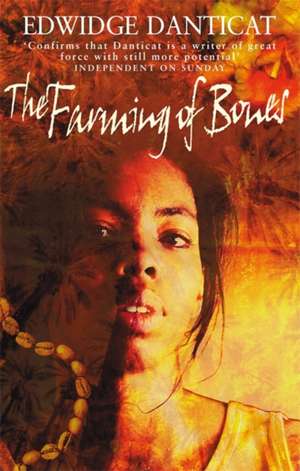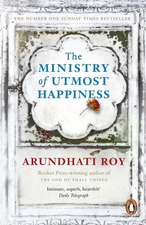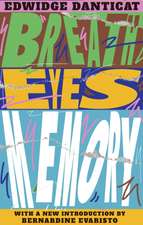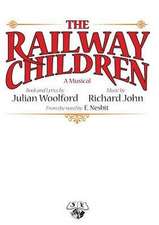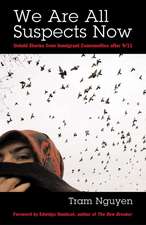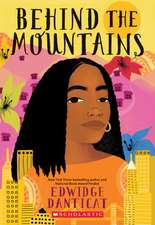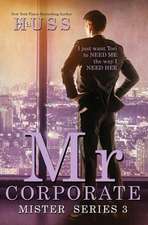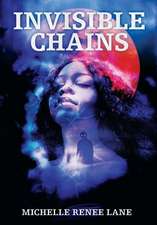The Farming Of Bones
Autor Edwidge Danticaten Limba Engleză Paperback – 6 apr 2000
| Toate formatele și edițiile | Preț | Express |
|---|---|---|
| Paperback (2) | 57.73 lei 3-5 săpt. | +28.46 lei 7-13 zile |
| Little Brown Book Group – 6 apr 2000 | 57.73 lei 3-5 săpt. | +28.46 lei 7-13 zile |
| Soho Press – 6 mai 2013 | 95.10 lei 3-5 săpt. |
Preț: 57.73 lei
Preț vechi: 76.02 lei
-24% Nou
Puncte Express: 87
Preț estimativ în valută:
11.05€ • 11.56$ • 9.14£
11.05€ • 11.56$ • 9.14£
Carte disponibilă
Livrare economică 15-29 martie
Livrare express 01-07 martie pentru 38.45 lei
Preluare comenzi: 021 569.72.76
Specificații
ISBN-13: 9780349111636
ISBN-10: 0349111634
Pagini: 320
Dimensiuni: 132 x 199 x 20 mm
Greutate: 0.25 kg
Ediția:New
Editura: Little Brown Book Group
Locul publicării:United Kingdom
ISBN-10: 0349111634
Pagini: 320
Dimensiuni: 132 x 199 x 20 mm
Greutate: 0.25 kg
Ediția:New
Editura: Little Brown Book Group
Locul publicării:United Kingdom
Notă biografică
EDWIDGE DANTICAT is the author of numerous books, including Brother, I’m Dying, which won the National Book Critics Circle Award and was a National Book Award finalist; Breath, Eyes, Memory, an Oprah Book Club selection; Krik? Krak!, a National Book Award finalist; and The Dew Breaker, winner of the inaugural Story Prize. The recipient of a MacArthur Fellowship, she has been published in The New Yorker, The New York Times, and elsewhere. The Farming of Bones won an American Book Award for fiction in 1999.
Extras
1
His name is Sebastien Onius.
He comes most nights to put an end to my nightmare, the
one I have all the time, of my parents drowning. While my
body is struggling against sleep, fighting itself to awaken, he
whispers for me to “lie still while I take you back.”
“Back where?” I ask without feeling my lips moving.
He says, “I will take you back into the cave across the river.”
I lurch at him and stumble, trying to rise. He levels my balance
with the tips of his long but curled fingers, each of them
alive on its own as they crawl towards me. I grab his body,
my head barely reaching the center of his chest. He is lavishly
handsome by the dim light of my castor oil lamp, even though
the cane stalks have ripped apart most of the skin on his shiny
black face, leaving him with crisscrossed trails of furrowed
scars. His arms are as wide as one of my bare thighs. They are
steel, hardened by four years of sugarcane harvests.
“Look at you,” he says, taking my face into one of his
spacious bowl-shaped hands, where the palms have lost their
lifelines to the machetes that cut the cane. “You are glowing
like a Christmas lantern, even with this skin that is the color
of driftwood ashes in the rain.”
“Do not say those things to me,” I mumble, the shadows of
sleep fighting me still. “This type of talk makes me feel naked.”
He runs his hand up and down my back. His rough callused
palms nip and chafe my skin, while the string of yellow
coffee beans on his bracelet rolls over and caresses the tender
places along my spine.
“Take off your nightdress,” he suggests, “and be naked for
true. When you are uncovered, you will know that you are fully
awake and I can simply look at you and be happy.” Then he slips
across to the other side of the room and watches every movement
of flesh as I shed my clothes. He is in a corner, away from
the lamp, a shadowed place where he sees me better than I see
him. “It is good for you to learn and trust that I am near you
even when you can’t place the balls of your eyes on me,” he says.
This makes me laugh and laugh loud, too loud for the middle
of the night. Now I am fully disrobed and fully awake. I
stumble quickly into his arms with my nightdress at my ankles.
Thin as he says I am, I am afraid to fold in two and disappear.
I’m afraid to be shy, distant, and cold. I am afraid I cease to
exist when he’s not there. I’m like one of those sea stones that
sucks its colors inside and loses its translucence once it’s taken
out into the sun, out of the froth of the waves. When he’s not
there, I’m afraid I know no one and no one knows me.
“Your clothes cover more than your skin,” he says. “You
become this uniform they make for you. Now you are only
you, just the flesh.”
It’s either be in a nightmare or be nowhere at all. Or otherwise
simply float inside these remembrances, grieving for who
I was, and even more for what I’ve become. But all this when
he’s not there.
“Look at your perfect little face,” he says, “your perfect
little shape, your perfect little body, a woman child with deep
black skin, all the shades of black in you, what we see and
what we don’t see, the good and the bad.”
He touches me like one brush of a single feather, perhaps
fearing, too, that I might vanish.
“Everything in your face is as it should be,” he says, “your
nose where it should be.”
“Oh, wi, it would have been sad,” I say, “if my nose had
been placed at the bottom of my feet.”
This time he is the one who laughs. Up close, his laughter
crumples his face, his shoulders rise and fall in an uneven
rhythm. I’m never sure whether he is only laughing or also crying
at the same time, even though I have never seen him cry.
I fall back asleep, draped over him. In the morning, before
the first lemongrass-scented ray of sunlight, he is gone. But I
can still feel his presence there, in the small square of my room.
I can smell his sweat, which is as thick as sugarcane juice when
he’s worked too much. I can still feel his lips, the eggplantviolet
gums that taste of greasy goat milk boiled to candied
sweetness with mustard-colored potatoes. I feel my cheeks rising
to his dense-as-toenails fingernails, the hollow beneath my
cheekbones, where the bracelet nicked me and left a perfectly
crescent-moon-shaped drop of dried blood. I feel the wet lines
in my back where his tongue gently traced the life-giving veins
to the chine, the faint handprints on my waist where he held on
too tight, perhaps during some moment when he felt me slipping.
And I can still count his breaths and how sometimes they
raced much faster than the beating of his heart.
When I was a child, I used to spend hours playing with my
shadow, something that my father warned could give me
nightmares, nightmares like seeing voices twirl in a hurricane
of rainbow colors and hearing the odd shapes of things
rise up and speak to define themselves. Playing with my
shadow made me, an only child, feel less alone. Whenever I
had playmates, they were never quite real or present for me.
I considered them only replacements for my shadow. There
were many shadows, too, in the life I had beyond childhood.
At times Sebastien Onius guarded me from the shadows. At
other times he was one of them.
2
Births and deaths were my parents’ work. I never thought I
would help at a birth myself until the screams rang through
the valley that morning, one voice like a thousand glasses
breaking. I was sitting in the yard, on the grass, sewing the
last button on a new indigo-colored shirt I was making for
Sebastien when I heard. Dropping the sewing basket, I ran
through the house, to the señora’s bedroom.
Señora Valencia was lying on her bed, her skin raining
sweat and the bottom part of her dress soaking in baby fluid.
Her water had broken.
As I lifted her legs to remove the sheets, Don Ignacio,
Señora Valencia’s father—we called him Papi—charged into
the room. Standing over her, he tugged at his butterfly-shaped
mustache with one age-mottled hand and patted her damp
forehead with the other.
“¡Ay no!” the señora shouted through her clenched grinding
teeth. “It’s too soon. Not for two months yet.”
Papi and I both took a few steps away when we saw the
blood-speckled flow streaming from between his daughter’s legs.
“I will go fetch the doctor,” he said. His hidelike skin
instantly paled to the color of warm eggshells.
As he rushed out the door, he shoved me back towards the
señora’s bed, as if to say with that abrupt gesture that the situation
being what it was, he had no other choice but to trust
his only child’s life to my inept hands.
Thankfully, after Papi left, the señora was still for a
moment. Her pain seemed to have subsided a bit. Drowning
in the depths of the mattress, she took a few breaths of relief.
We sat for a while with her fingers clinging to mine, like
when we were girls and we both slept in the same room.
Even though she was supposed to sleep in her own canopy
bed and I was to sleep on a smaller cot across from hers,
she would invite me onto her bed after her father had gone
to sleep and the two of us would jump up and down on
the mattress, play with our shadows, and pretend we were
four happy girls, forcing the housemaid—Juana—to come
in and threaten to wake Papi who would give us a deeper
desire for slumber with a spanking.
“Amabelle, is the baby’s bed ready?” With her hand
still grasping mine, Señora Valencia glanced at the cradle,
squeezed between the louvered patio doors and her favorite
armoire deeply carved with giant orchids and hummingbirds
in flight.
“Everything is prepared, Señora,” I said.
Even though I wasn’t used to praying, I whispered a few
words to La Virgen de la Carmen that the doctor would come
before the señora was in agony again.
“I want my husband.” The señora clamped her eyes shut,
quietly forcing the tears down her face.
“We will send for him,” I said. “Tell me how your body
feels.”
“The pain is less now, but when it comes on strong, it feels
like someone shoves a knife into my back.”
The baby could be leaning on her back, I thought,
remembering one of my father’s favorite expressions when
he and my mother were gathering leaves to cram into rum
and firewater bottles before rushing off to a birthing. Without
remembering what those leaves were, I couldn’t lessen
the señora’s pain. Yes, there was plenty of rum and firewa -
ter in the house, but I didn’t want to leave her alone and go
to the pantry to fetch them. Anything could happen in my
absence, the worst of it being if a lady of her stature had to
push that child out alone, like a field hand suddenly feeling
her labor pains beneath a tent of cane.
“Amabelle, I am not going to die, am I?” She was shouting
at the top of the soft murmuring voice she’d had since childhood,
panting with renewed distress between her words.
We were alone in the house now. I had to calm her, to help
her, as she had always counted on me to do, as her father had
always counted on me to do.
“Before this, the most pain I ever felt was when a wasp bit
the back of my hand and made it swell,” she declared.
“This will pain you more, but not so much more,” I said.
A soft breeze drifted in through the small gaps in the patio
doors. She reached for the mosquito netting tied above her
head, seized it, and twisted the cloth.
Gooseflesh sprouted all over her arms. She grabbed my
wrist so tight that my fingers became numb. “If Doctor
Javier doesn’t come, you’ll have to be the one to do this for
me!” she yelled.
I yanked my hands from hers and massaged her arms and
taut shoulders to help prepare her body for the birth. “Brace
yourself,” I said. “Save your strength for the baby.”
“Virgencita!” she shouted at the ceiling as I dragged her
housedress above her head. “I’m going to think of nothing
but you, Virgencita, until this pain becomes a child.”
“Let the air enter and leave your mouth freely,” I suggested.
I remembered my mother saying that it was important that
the women breathe normally if they wanted to feel less pain.
“I feel a kind of vertigo,” she said, twitching like live flesh
on fire. Thrashing on the bed, she gulped desperate mouthfuls
of air, even though her face was swelling, the veins throbbing
like a drumbeat along her temples.
“I will not have my baby like this,” she said, trying to pin
herself to a sunken spot in the middle of the bed. “I will not
permit anyone to walk in and see me bare, naked.”
“Please, Señora, give this all your attention.”
“At least you’ll cover my legs if they come?” She grabbed
her belly with both hands to greet another surge of pain.
I felt the contents of my stomach rise and settle in the middle
of my chest when the baby’s head entered her canal. Still I
felt some relief, even though I know she did not. I told myself,
Now I can see a child will truly come of this agony; this is not
entirely impossible.
In spite of my hopefulness, the baby stopped coming forward
and lay at the near end of her birth canal, as though
it had suddenly changed its mind and decided not to leave.
Numbed by the pain, the señora did not move, either.
“Señora, it is time,” I said.
“Time for what?” she asked, her small rounded teeth hammering
her lower lip.
“It’s time to push out your child. I see the head. The hair is
dark and soft, in ringlets like yours.”
She pushed with all her might, like an ant trying to move a
tree. The head slipped down, filling my open hand.
“Señora, this child will be yours,” I said to soothe her.
“You will be its mother for the rest of your days. It will be
yours like watercress belongs to water and river lilies belong
to the river.”
“Like I belonged to my mother,” she chimed in, catching
her breath.
“Now you will know for yourself why they say children
are the prize of life.”
“Be quick!” she commanded. “I want to see it. I want to
hold it. I want to know if it is a girl or a boy.”
Her forehead creased with anticipation. She tightened
every muscle and propelled the child’s shoulders forward.
The infant’s body fell into my arms, covering my house
apron with blood.
“You have a son.” I proudly raised the child from between
her legs and held him up so she could see.
The umbilical cord stretched from inside her as I cradled
the boy child against my chest. I wiped him clean with an
embroidered towel that I’d cut and stitched myself soon after
I’d learned of the conception. I rapped twice on his bottom
but he did not cry. It was Señora Valencia who cried instead.
“I always thought it would be a girl,” she said. “Every
Sunday when I came out of Mass, all the little boys would
crowd around my belly as though they were in love with her.”
Like Señora Valencia, her son was coconut-cream colored,
his cheeks and forehead the blush pink of water lilies.
“Is he handsome? Are all his fingers and toes there?” she
asked. “I don’t think I heard him cry.”
“I thought I would leave it to you to strike him again.”
I felt a sense of great accomplishment as I tore a white ribbon
from one of the cradle pillows, wrapped it around the
umbilical cord, then used one of the señora’s husband’s shaving
blades to sever the boy from his mother. Señora Valencia was
opening her arms to take him when a yell came. Not from him,
but from her. A pained squawk from the back of her throat.
“It starts again!” she screamed.
“What do you feel, Señora?”
“The birth pains again.”
“It is your baby’s old nest, forcing its way out,” I said,
remembering one of my mother’s favorite expressions. The
baby’s old nest took its time coming out. It was like another
child altogether. “You have to push once more to be certain it
all leaves you.”
She pushed even harder than before. Another head of curly
black hair slid down between her legs, swimming out with the
afterbirth.
I hurried to put her son down in the cradle and went back
to fetch the other child. I was feeling more experienced now.
Reaching in the same way, I pulled out the head. The tiny
shoulders emerged easily, then the scraggly legs.
The firstborn wailed as I drew another infant from
between Señora Valencia’s thighs. A little girl gasped for
breath, a thin brown veil, like layers of spiderwebs, covering
her face. The umbilical cord had curled itself in a bloody
wreath around her neck, encircling every inch between her
chin and shoulders.
Señora Valencia tore the caul from her daughter’s face with
her fingers. I used the blade to snip the umbilical cord from
around her neck and soon the little girl cried, falling into a
chorus with her brother.
“It’s a curse, isn’t it?” the señora said, taking her daughter
into her arms. “A caul, and the umbilical cord too.”
She gently blew her breath over her daughter’s closed eyes,
encouraging the child to open them. I took the little boy out
of the cradle now and brought him over to the bed to be near
his mother and sister. The two babies stopped crying when we
rubbed the soles of their feet together.
Señora Valencia used the clean end of a bedsheet to wipe the
blood off her daughter’s skin. The girl appeared much smaller
than her twin, less than half his already small size. Even in her
mother’s arms, she lay on her side with her tiny legs pulled up
to her belly. Her skin was a deep bronze, between the colors
of nut shells and black salsify.
Señora Valencia motioned for me to move even closer with
her son.
“They differ in appearance.” She wanted another opinion.
“Your son favors your cherimoya milk color,” I said.
“And my daughter favors you,” she said. “My daughter
is a chameleon. She’s taken your color from the mere sight of
your face.”
Her fingers still trembling, she made the sign of the holy
cross from her forehead down to the sweaty cave between
her swollen breasts. It was an especially hot morning. The
air was heavy with the scent of lemongrass and flame trees
losing their morning dew to the sun and with the smell of
all the blood the señora had lost to her children. I refastened
the closed patio doors, completely shutting out the outside
air.
“Will you light a candle to La Virgencita, Amabelle? I
promised her I would do this after I gave birth.”
I lit a white candle and set it on the layette chest beside the
cradle that had been the señora’s own as a child.
“Do you think the children will love me?” she asked.
“Don’t you already love them?”
“I feel as if they’ve always been here.”
“Do you know what you will name them?”
“I think I’ll name my daughter Rosalinda Teresa to honor
my mother. I’ll leave it to my husband to name our son. Amabelle,
I’m so happy today. You and me. Look at what we have
done.”
“It was you, Señora. You did this.”
“How does my daughter look? How do you find my dusky
rose? Does she please you? Do they please you? She’s so small.
Take her, please, and let me hold my son now.”
We exchanged children. For a moment Rosalinda seemed
to be floating between our hands, in danger of falling. I looked
into her tiny face, still streaked with her mother’s blood, and
I cradled her more tightly in my arms.
“Amabelle do you think my daughter will always be the
color she is now?” Señora Valencia asked. “My poor love,
what if she’s mistaken for one of your people?”
His name is Sebastien Onius.
He comes most nights to put an end to my nightmare, the
one I have all the time, of my parents drowning. While my
body is struggling against sleep, fighting itself to awaken, he
whispers for me to “lie still while I take you back.”
“Back where?” I ask without feeling my lips moving.
He says, “I will take you back into the cave across the river.”
I lurch at him and stumble, trying to rise. He levels my balance
with the tips of his long but curled fingers, each of them
alive on its own as they crawl towards me. I grab his body,
my head barely reaching the center of his chest. He is lavishly
handsome by the dim light of my castor oil lamp, even though
the cane stalks have ripped apart most of the skin on his shiny
black face, leaving him with crisscrossed trails of furrowed
scars. His arms are as wide as one of my bare thighs. They are
steel, hardened by four years of sugarcane harvests.
“Look at you,” he says, taking my face into one of his
spacious bowl-shaped hands, where the palms have lost their
lifelines to the machetes that cut the cane. “You are glowing
like a Christmas lantern, even with this skin that is the color
of driftwood ashes in the rain.”
“Do not say those things to me,” I mumble, the shadows of
sleep fighting me still. “This type of talk makes me feel naked.”
He runs his hand up and down my back. His rough callused
palms nip and chafe my skin, while the string of yellow
coffee beans on his bracelet rolls over and caresses the tender
places along my spine.
“Take off your nightdress,” he suggests, “and be naked for
true. When you are uncovered, you will know that you are fully
awake and I can simply look at you and be happy.” Then he slips
across to the other side of the room and watches every movement
of flesh as I shed my clothes. He is in a corner, away from
the lamp, a shadowed place where he sees me better than I see
him. “It is good for you to learn and trust that I am near you
even when you can’t place the balls of your eyes on me,” he says.
This makes me laugh and laugh loud, too loud for the middle
of the night. Now I am fully disrobed and fully awake. I
stumble quickly into his arms with my nightdress at my ankles.
Thin as he says I am, I am afraid to fold in two and disappear.
I’m afraid to be shy, distant, and cold. I am afraid I cease to
exist when he’s not there. I’m like one of those sea stones that
sucks its colors inside and loses its translucence once it’s taken
out into the sun, out of the froth of the waves. When he’s not
there, I’m afraid I know no one and no one knows me.
“Your clothes cover more than your skin,” he says. “You
become this uniform they make for you. Now you are only
you, just the flesh.”
It’s either be in a nightmare or be nowhere at all. Or otherwise
simply float inside these remembrances, grieving for who
I was, and even more for what I’ve become. But all this when
he’s not there.
“Look at your perfect little face,” he says, “your perfect
little shape, your perfect little body, a woman child with deep
black skin, all the shades of black in you, what we see and
what we don’t see, the good and the bad.”
He touches me like one brush of a single feather, perhaps
fearing, too, that I might vanish.
“Everything in your face is as it should be,” he says, “your
nose where it should be.”
“Oh, wi, it would have been sad,” I say, “if my nose had
been placed at the bottom of my feet.”
This time he is the one who laughs. Up close, his laughter
crumples his face, his shoulders rise and fall in an uneven
rhythm. I’m never sure whether he is only laughing or also crying
at the same time, even though I have never seen him cry.
I fall back asleep, draped over him. In the morning, before
the first lemongrass-scented ray of sunlight, he is gone. But I
can still feel his presence there, in the small square of my room.
I can smell his sweat, which is as thick as sugarcane juice when
he’s worked too much. I can still feel his lips, the eggplantviolet
gums that taste of greasy goat milk boiled to candied
sweetness with mustard-colored potatoes. I feel my cheeks rising
to his dense-as-toenails fingernails, the hollow beneath my
cheekbones, where the bracelet nicked me and left a perfectly
crescent-moon-shaped drop of dried blood. I feel the wet lines
in my back where his tongue gently traced the life-giving veins
to the chine, the faint handprints on my waist where he held on
too tight, perhaps during some moment when he felt me slipping.
And I can still count his breaths and how sometimes they
raced much faster than the beating of his heart.
When I was a child, I used to spend hours playing with my
shadow, something that my father warned could give me
nightmares, nightmares like seeing voices twirl in a hurricane
of rainbow colors and hearing the odd shapes of things
rise up and speak to define themselves. Playing with my
shadow made me, an only child, feel less alone. Whenever I
had playmates, they were never quite real or present for me.
I considered them only replacements for my shadow. There
were many shadows, too, in the life I had beyond childhood.
At times Sebastien Onius guarded me from the shadows. At
other times he was one of them.
2
Births and deaths were my parents’ work. I never thought I
would help at a birth myself until the screams rang through
the valley that morning, one voice like a thousand glasses
breaking. I was sitting in the yard, on the grass, sewing the
last button on a new indigo-colored shirt I was making for
Sebastien when I heard. Dropping the sewing basket, I ran
through the house, to the señora’s bedroom.
Señora Valencia was lying on her bed, her skin raining
sweat and the bottom part of her dress soaking in baby fluid.
Her water had broken.
As I lifted her legs to remove the sheets, Don Ignacio,
Señora Valencia’s father—we called him Papi—charged into
the room. Standing over her, he tugged at his butterfly-shaped
mustache with one age-mottled hand and patted her damp
forehead with the other.
“¡Ay no!” the señora shouted through her clenched grinding
teeth. “It’s too soon. Not for two months yet.”
Papi and I both took a few steps away when we saw the
blood-speckled flow streaming from between his daughter’s legs.
“I will go fetch the doctor,” he said. His hidelike skin
instantly paled to the color of warm eggshells.
As he rushed out the door, he shoved me back towards the
señora’s bed, as if to say with that abrupt gesture that the situation
being what it was, he had no other choice but to trust
his only child’s life to my inept hands.
Thankfully, after Papi left, the señora was still for a
moment. Her pain seemed to have subsided a bit. Drowning
in the depths of the mattress, she took a few breaths of relief.
We sat for a while with her fingers clinging to mine, like
when we were girls and we both slept in the same room.
Even though she was supposed to sleep in her own canopy
bed and I was to sleep on a smaller cot across from hers,
she would invite me onto her bed after her father had gone
to sleep and the two of us would jump up and down on
the mattress, play with our shadows, and pretend we were
four happy girls, forcing the housemaid—Juana—to come
in and threaten to wake Papi who would give us a deeper
desire for slumber with a spanking.
“Amabelle, is the baby’s bed ready?” With her hand
still grasping mine, Señora Valencia glanced at the cradle,
squeezed between the louvered patio doors and her favorite
armoire deeply carved with giant orchids and hummingbirds
in flight.
“Everything is prepared, Señora,” I said.
Even though I wasn’t used to praying, I whispered a few
words to La Virgen de la Carmen that the doctor would come
before the señora was in agony again.
“I want my husband.” The señora clamped her eyes shut,
quietly forcing the tears down her face.
“We will send for him,” I said. “Tell me how your body
feels.”
“The pain is less now, but when it comes on strong, it feels
like someone shoves a knife into my back.”
The baby could be leaning on her back, I thought,
remembering one of my father’s favorite expressions when
he and my mother were gathering leaves to cram into rum
and firewater bottles before rushing off to a birthing. Without
remembering what those leaves were, I couldn’t lessen
the señora’s pain. Yes, there was plenty of rum and firewa -
ter in the house, but I didn’t want to leave her alone and go
to the pantry to fetch them. Anything could happen in my
absence, the worst of it being if a lady of her stature had to
push that child out alone, like a field hand suddenly feeling
her labor pains beneath a tent of cane.
“Amabelle, I am not going to die, am I?” She was shouting
at the top of the soft murmuring voice she’d had since childhood,
panting with renewed distress between her words.
We were alone in the house now. I had to calm her, to help
her, as she had always counted on me to do, as her father had
always counted on me to do.
“Before this, the most pain I ever felt was when a wasp bit
the back of my hand and made it swell,” she declared.
“This will pain you more, but not so much more,” I said.
A soft breeze drifted in through the small gaps in the patio
doors. She reached for the mosquito netting tied above her
head, seized it, and twisted the cloth.
Gooseflesh sprouted all over her arms. She grabbed my
wrist so tight that my fingers became numb. “If Doctor
Javier doesn’t come, you’ll have to be the one to do this for
me!” she yelled.
I yanked my hands from hers and massaged her arms and
taut shoulders to help prepare her body for the birth. “Brace
yourself,” I said. “Save your strength for the baby.”
“Virgencita!” she shouted at the ceiling as I dragged her
housedress above her head. “I’m going to think of nothing
but you, Virgencita, until this pain becomes a child.”
“Let the air enter and leave your mouth freely,” I suggested.
I remembered my mother saying that it was important that
the women breathe normally if they wanted to feel less pain.
“I feel a kind of vertigo,” she said, twitching like live flesh
on fire. Thrashing on the bed, she gulped desperate mouthfuls
of air, even though her face was swelling, the veins throbbing
like a drumbeat along her temples.
“I will not have my baby like this,” she said, trying to pin
herself to a sunken spot in the middle of the bed. “I will not
permit anyone to walk in and see me bare, naked.”
“Please, Señora, give this all your attention.”
“At least you’ll cover my legs if they come?” She grabbed
her belly with both hands to greet another surge of pain.
I felt the contents of my stomach rise and settle in the middle
of my chest when the baby’s head entered her canal. Still I
felt some relief, even though I know she did not. I told myself,
Now I can see a child will truly come of this agony; this is not
entirely impossible.
In spite of my hopefulness, the baby stopped coming forward
and lay at the near end of her birth canal, as though
it had suddenly changed its mind and decided not to leave.
Numbed by the pain, the señora did not move, either.
“Señora, it is time,” I said.
“Time for what?” she asked, her small rounded teeth hammering
her lower lip.
“It’s time to push out your child. I see the head. The hair is
dark and soft, in ringlets like yours.”
She pushed with all her might, like an ant trying to move a
tree. The head slipped down, filling my open hand.
“Señora, this child will be yours,” I said to soothe her.
“You will be its mother for the rest of your days. It will be
yours like watercress belongs to water and river lilies belong
to the river.”
“Like I belonged to my mother,” she chimed in, catching
her breath.
“Now you will know for yourself why they say children
are the prize of life.”
“Be quick!” she commanded. “I want to see it. I want to
hold it. I want to know if it is a girl or a boy.”
Her forehead creased with anticipation. She tightened
every muscle and propelled the child’s shoulders forward.
The infant’s body fell into my arms, covering my house
apron with blood.
“You have a son.” I proudly raised the child from between
her legs and held him up so she could see.
The umbilical cord stretched from inside her as I cradled
the boy child against my chest. I wiped him clean with an
embroidered towel that I’d cut and stitched myself soon after
I’d learned of the conception. I rapped twice on his bottom
but he did not cry. It was Señora Valencia who cried instead.
“I always thought it would be a girl,” she said. “Every
Sunday when I came out of Mass, all the little boys would
crowd around my belly as though they were in love with her.”
Like Señora Valencia, her son was coconut-cream colored,
his cheeks and forehead the blush pink of water lilies.
“Is he handsome? Are all his fingers and toes there?” she
asked. “I don’t think I heard him cry.”
“I thought I would leave it to you to strike him again.”
I felt a sense of great accomplishment as I tore a white ribbon
from one of the cradle pillows, wrapped it around the
umbilical cord, then used one of the señora’s husband’s shaving
blades to sever the boy from his mother. Señora Valencia was
opening her arms to take him when a yell came. Not from him,
but from her. A pained squawk from the back of her throat.
“It starts again!” she screamed.
“What do you feel, Señora?”
“The birth pains again.”
“It is your baby’s old nest, forcing its way out,” I said,
remembering one of my mother’s favorite expressions. The
baby’s old nest took its time coming out. It was like another
child altogether. “You have to push once more to be certain it
all leaves you.”
She pushed even harder than before. Another head of curly
black hair slid down between her legs, swimming out with the
afterbirth.
I hurried to put her son down in the cradle and went back
to fetch the other child. I was feeling more experienced now.
Reaching in the same way, I pulled out the head. The tiny
shoulders emerged easily, then the scraggly legs.
The firstborn wailed as I drew another infant from
between Señora Valencia’s thighs. A little girl gasped for
breath, a thin brown veil, like layers of spiderwebs, covering
her face. The umbilical cord had curled itself in a bloody
wreath around her neck, encircling every inch between her
chin and shoulders.
Señora Valencia tore the caul from her daughter’s face with
her fingers. I used the blade to snip the umbilical cord from
around her neck and soon the little girl cried, falling into a
chorus with her brother.
“It’s a curse, isn’t it?” the señora said, taking her daughter
into her arms. “A caul, and the umbilical cord too.”
She gently blew her breath over her daughter’s closed eyes,
encouraging the child to open them. I took the little boy out
of the cradle now and brought him over to the bed to be near
his mother and sister. The two babies stopped crying when we
rubbed the soles of their feet together.
Señora Valencia used the clean end of a bedsheet to wipe the
blood off her daughter’s skin. The girl appeared much smaller
than her twin, less than half his already small size. Even in her
mother’s arms, she lay on her side with her tiny legs pulled up
to her belly. Her skin was a deep bronze, between the colors
of nut shells and black salsify.
Señora Valencia motioned for me to move even closer with
her son.
“They differ in appearance.” She wanted another opinion.
“Your son favors your cherimoya milk color,” I said.
“And my daughter favors you,” she said. “My daughter
is a chameleon. She’s taken your color from the mere sight of
your face.”
Her fingers still trembling, she made the sign of the holy
cross from her forehead down to the sweaty cave between
her swollen breasts. It was an especially hot morning. The
air was heavy with the scent of lemongrass and flame trees
losing their morning dew to the sun and with the smell of
all the blood the señora had lost to her children. I refastened
the closed patio doors, completely shutting out the outside
air.
“Will you light a candle to La Virgencita, Amabelle? I
promised her I would do this after I gave birth.”
I lit a white candle and set it on the layette chest beside the
cradle that had been the señora’s own as a child.
“Do you think the children will love me?” she asked.
“Don’t you already love them?”
“I feel as if they’ve always been here.”
“Do you know what you will name them?”
“I think I’ll name my daughter Rosalinda Teresa to honor
my mother. I’ll leave it to my husband to name our son. Amabelle,
I’m so happy today. You and me. Look at what we have
done.”
“It was you, Señora. You did this.”
“How does my daughter look? How do you find my dusky
rose? Does she please you? Do they please you? She’s so small.
Take her, please, and let me hold my son now.”
We exchanged children. For a moment Rosalinda seemed
to be floating between our hands, in danger of falling. I looked
into her tiny face, still streaked with her mother’s blood, and
I cradled her more tightly in my arms.
“Amabelle do you think my daughter will always be the
color she is now?” Señora Valencia asked. “My poor love,
what if she’s mistaken for one of your people?”
Recenzii
Praise for The Farming of Bones
A New York Times Notable Book
ALA Booklist Editor’s Choice
"One of the Best Books of the Year"—Publishers Weekly
"A powerful, haunting novel ... every chapter cuts deep, and you feel it."
—Time
“Danticat ... is a brilliant storyteller. Her language is simple, gorgeous, and enticing. Her perfect pacing and seamless narrative ... make each character’s destiny seem inexorable.”
—Time Out New York
“[With] hallucinatory vigor and a sense of mission ... Danticat capably evokes the shock with which a small personal world is disrupted by military mayhem.... The Farming of Bones offers ample confirmation of Edwidge Danticat’s considerable talents.”
—The New York Times Book Review
“A passionate story ... Richly textured, deeply personal details particularize each of Danticat’s characters and give poignancy to their lives. Often, her tales take on the quality of a legend.”
—The Seattle Times
“A beautiful and tragic book ... Danticat startles and enraptures readers once again with The Farming of Bones, a novel so mature in its exposition, so captivating in its spirit that it perpetually astonishes the reader in every remarkable chapter.”
—The Orlando Sentinel
“Danticat ... infuses the dreamlike prose of her earlier works with a politicized resonance in her second novel. ... An eyeopening and delicately written testimonial to the ‘nameless and faceless’ who died in a historically overlooked conflict.”
—The Wall Street Journal
“Because the larger themes of trauma and collective memory are in the hands of a gifted fiction writer, the novel cannot be summarized by casual reference to genocidal fact. Indeed, some of the most interesting writers today—Toni Morrison in Paradise, Caryl Phillips in Cambridge—are blending history and fiction, imparting information, in the manner of nineteenth century novelists, without seeming to.... A beautifully conceived work, with monumental themes.”
—The Nation
“Steely, nuanced ... it’s a testament to Danticat’s skill that Amabelle’s musical, sorrowing voice never falters.”
—The New Yorker
“A surprisingly subtle and wise book.”
—Chicago Tribune
“An admirable, even brilliant, work by an author of tremendous talent ... a story that will haunt both the mind and the soul.”
—The Denver Post
“Exquisite ... Passionate and heartrending, Bones lingers in the consciousness like an unforgettable nightmare.”
—Entertainment Weekly
“An erotic, devastating tale ... Danticat ... lets us feel the pain and hope of Amabelle’s journey, using language that’s poetic and understated all at once.”
—Madamoiselle
“A beautiful book. Danticat’s writing is superb, drifting easily from the visionary and ecstatic to the bare and simple notice of things as they are.”
—The Sunday Oregonian
“Stunning both as revelation of a forgotten atrocity and as demonstration of narrative craft.”
—The Cleveland Plain-Dealer
“Danticat gives us fully realized characters who endure their lives with dignity, a sensuously atmospheric setting and a perfectly paced narrative written in prose that is lushly poetic and erotic, specifically detailed ... and starkly realistic. While this novel is deeply sad, it is infused with Danticat’s fierce need to bear witness.”
—Publishers Weekly, Starred Review
A New York Times Notable Book
ALA Booklist Editor’s Choice
"One of the Best Books of the Year"—Publishers Weekly
"A powerful, haunting novel ... every chapter cuts deep, and you feel it."
—Time
“Danticat ... is a brilliant storyteller. Her language is simple, gorgeous, and enticing. Her perfect pacing and seamless narrative ... make each character’s destiny seem inexorable.”
—Time Out New York
“[With] hallucinatory vigor and a sense of mission ... Danticat capably evokes the shock with which a small personal world is disrupted by military mayhem.... The Farming of Bones offers ample confirmation of Edwidge Danticat’s considerable talents.”
—The New York Times Book Review
“A passionate story ... Richly textured, deeply personal details particularize each of Danticat’s characters and give poignancy to their lives. Often, her tales take on the quality of a legend.”
—The Seattle Times
“A beautiful and tragic book ... Danticat startles and enraptures readers once again with The Farming of Bones, a novel so mature in its exposition, so captivating in its spirit that it perpetually astonishes the reader in every remarkable chapter.”
—The Orlando Sentinel
“Danticat ... infuses the dreamlike prose of her earlier works with a politicized resonance in her second novel. ... An eyeopening and delicately written testimonial to the ‘nameless and faceless’ who died in a historically overlooked conflict.”
—The Wall Street Journal
“Because the larger themes of trauma and collective memory are in the hands of a gifted fiction writer, the novel cannot be summarized by casual reference to genocidal fact. Indeed, some of the most interesting writers today—Toni Morrison in Paradise, Caryl Phillips in Cambridge—are blending history and fiction, imparting information, in the manner of nineteenth century novelists, without seeming to.... A beautifully conceived work, with monumental themes.”
—The Nation
“Steely, nuanced ... it’s a testament to Danticat’s skill that Amabelle’s musical, sorrowing voice never falters.”
—The New Yorker
“A surprisingly subtle and wise book.”
—Chicago Tribune
“An admirable, even brilliant, work by an author of tremendous talent ... a story that will haunt both the mind and the soul.”
—The Denver Post
“Exquisite ... Passionate and heartrending, Bones lingers in the consciousness like an unforgettable nightmare.”
—Entertainment Weekly
“An erotic, devastating tale ... Danticat ... lets us feel the pain and hope of Amabelle’s journey, using language that’s poetic and understated all at once.”
—Madamoiselle
“A beautiful book. Danticat’s writing is superb, drifting easily from the visionary and ecstatic to the bare and simple notice of things as they are.”
—The Sunday Oregonian
“Stunning both as revelation of a forgotten atrocity and as demonstration of narrative craft.”
—The Cleveland Plain-Dealer
“Danticat gives us fully realized characters who endure their lives with dignity, a sensuously atmospheric setting and a perfectly paced narrative written in prose that is lushly poetic and erotic, specifically detailed ... and starkly realistic. While this novel is deeply sad, it is infused with Danticat’s fierce need to bear witness.”
—Publishers Weekly, Starred Review
